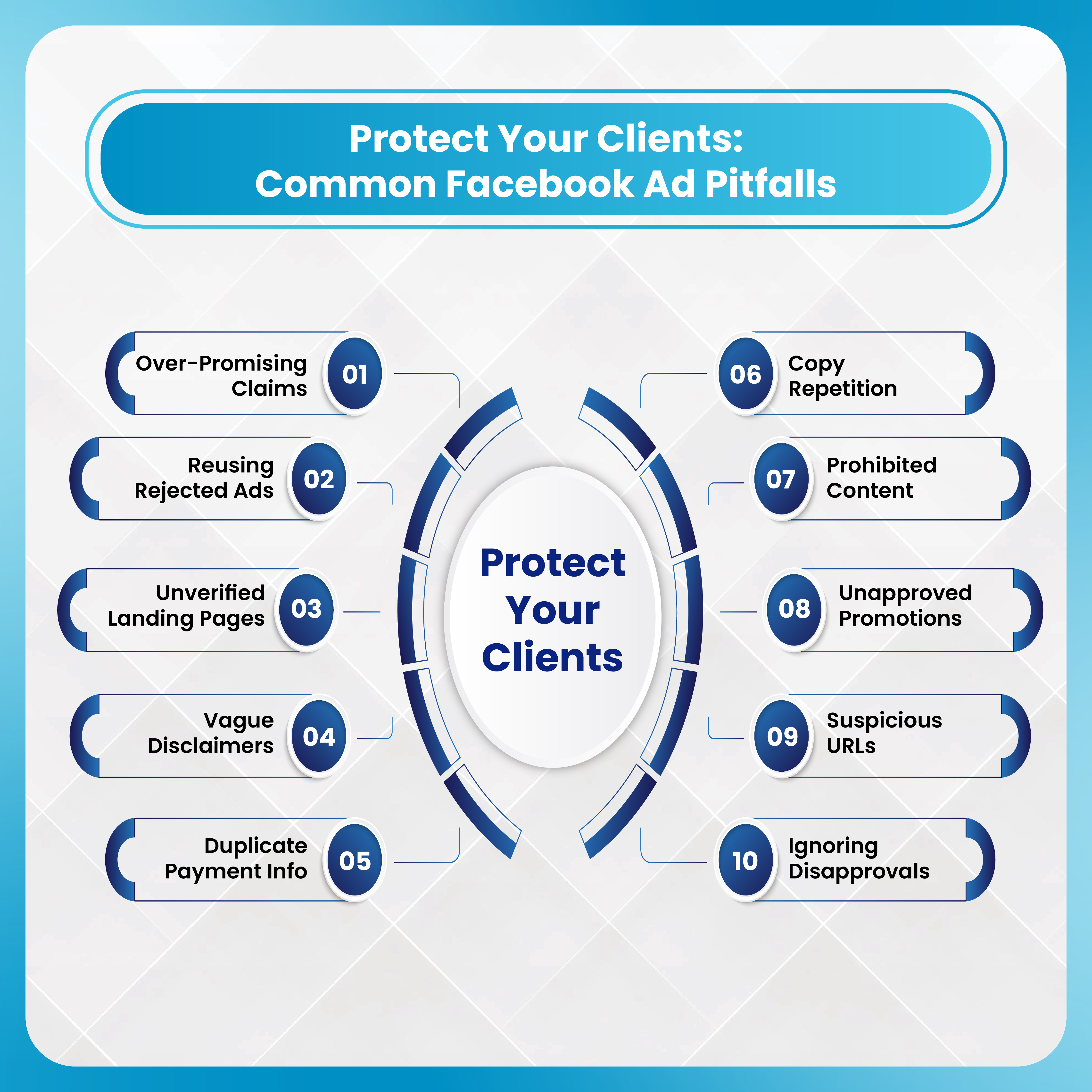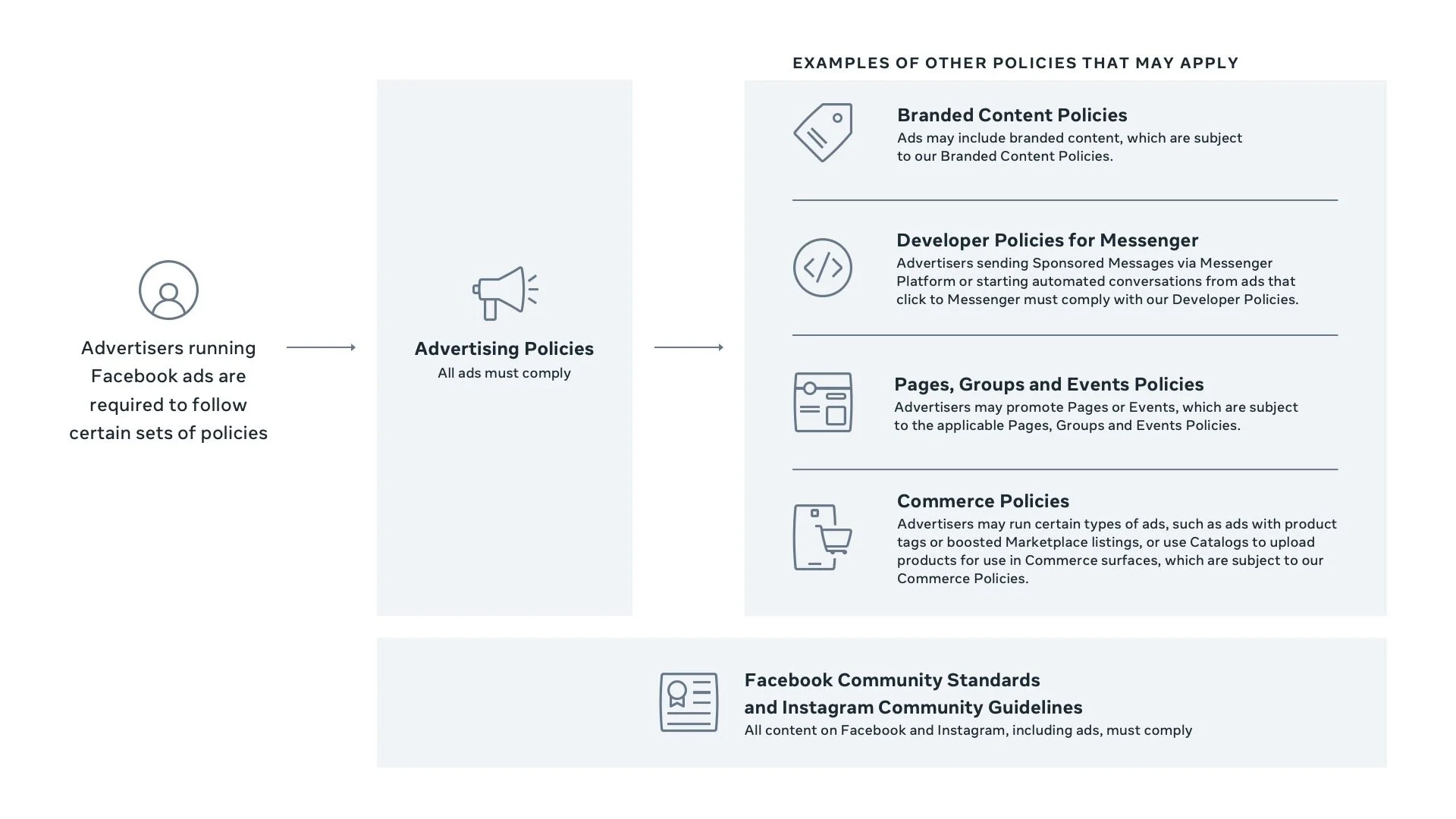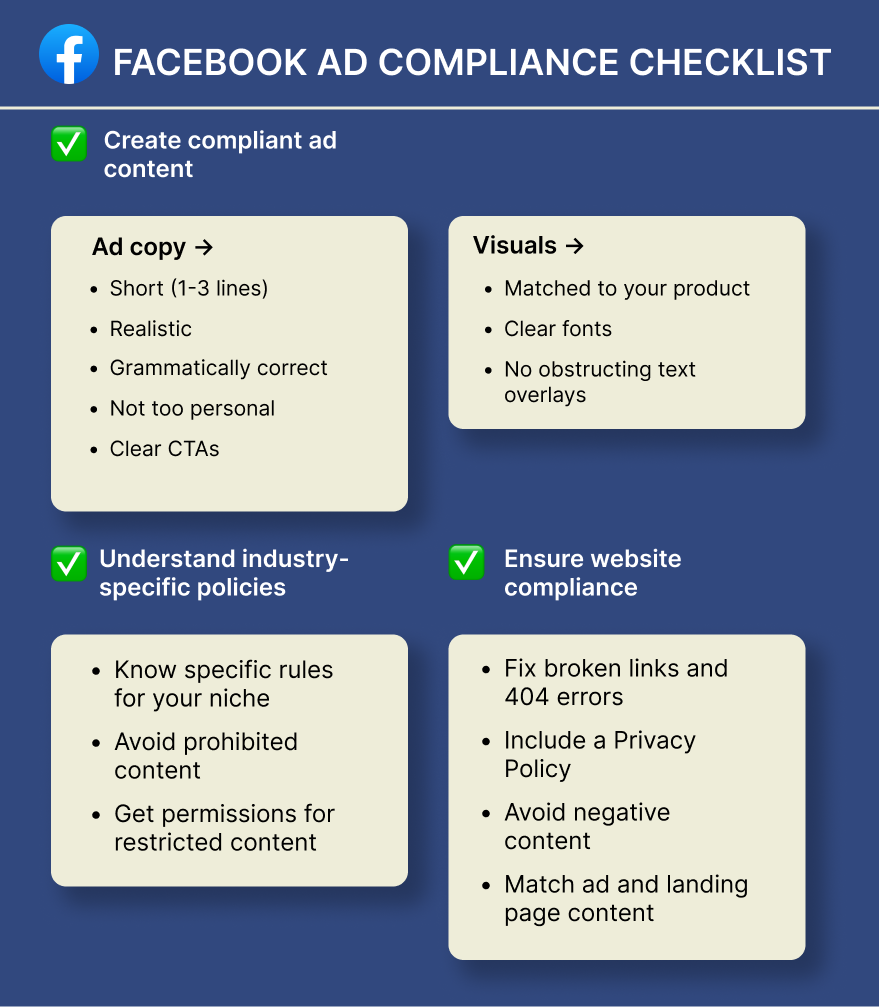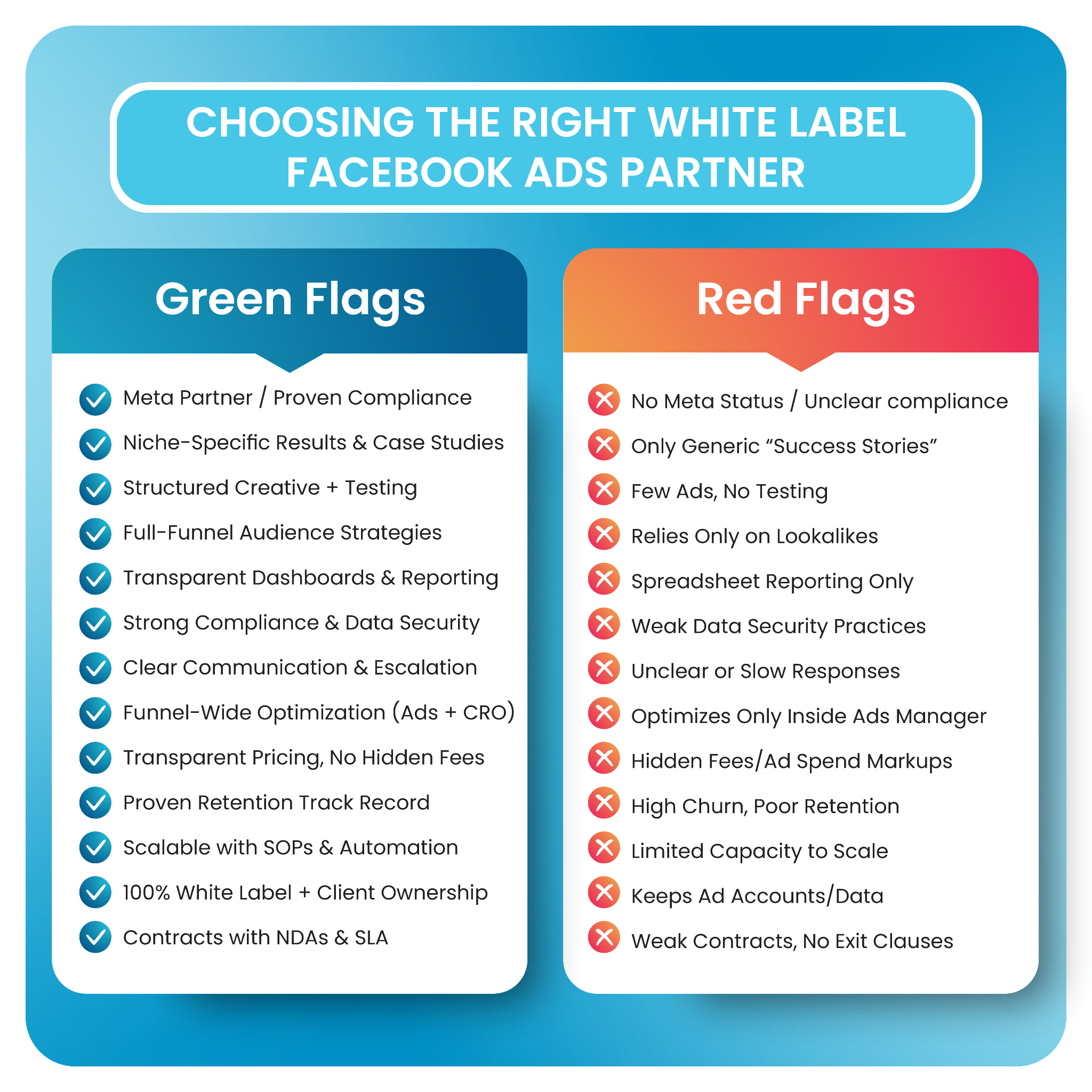Facebook advertising has become the backbone of modern digital marketing strategies. With over 2.9 billion monthly active users, the platform offers unparalleled reach for businesses looking to connect with their target audiences. However, this massive opportunity comes with significant challenges—particularly around ad compliance.
Recent data shows that Facebook disabled approximately 1.1 billion fake accounts in the first quarter of 2024 alone, highlighting the platform's increasingly strict enforcement policies. For marketing agencies managing multiple client accounts, staying compliant isn't just about following rules—it's about protecting their business and maintaining client relationships.
This is where white label Facebook ads services become invaluable. These specialized partners help agencies navigate complex compliance requirements while delivering exceptional results for their clients.
The Anatomy of a Facebook Ads Account Ban
Understanding the different types of Facebook account restrictions is crucial for any agency serious about maintaining long-term success on the platform.
Facebook enforces rules through a range of actions, each designed to address different levels of non-compliance. Understanding these can help advertisers minimize risk and maintain account health:
- Ad-Level Disapprovals: These occur when an individual ad fails to meet Facebook’s advertising policies. While the rejected ad cannot run, the advertiser’s overall account remains active. This is often the first warning sign that content may need adjustment.
- Account-Level Restrictions: If violations persist, Facebook may impose limitations on the account itself. This can include restrictions on certain ad types, reduced ad delivery, or temporary spending caps. Such measures are designed to prevent further breaches while still allowing some advertising activity.
- Temporary Suspensions: For repeated or more serious violations, accounts may be suspended for a specific period, ranging from 24 hours to several weeks. During this time, all ad activity is paused, and advertisers must often undergo a review process before regaining access.
- Permanent Account Bans: The most severe action is a permanent ban, which results in full removal from the platform. Once banned, the advertiser loses access to all campaigns, assets, and pages associated with the account, and there is typically no recourse to appeal.
Common Triggers for Account Bans
Understanding what commonly triggers bans can help advertisers stay compliant and avoid disruptions:
- Policy Violations: Content that violates Facebook’s advertising standards—such as misleading claims, prohibited products, or inappropriate imagery—is the most frequent cause of account issues. Even unintentional violations can escalate if repeated.
- Repeated Ad Disapprovals: Multiple ad rejections within a short period signal to Facebook that the account may not be adhering to its guidelines. Frequent disapprovals can lead to account-level restrictions or suspensions.
- Payment Issues: Problems with transactions, such as failed payments, disputed charges, or unusual spending patterns, often trigger additional scrutiny. Maintaining accurate billing information and monitoring transactions can prevent unnecessary restrictions.
- Suspicious Activity: Facebook monitors account behavior for signs of automation, sudden changes, or atypical login patterns. Rapid adjustments to campaigns, frequent password changes, or multiple logins from different locations can all raise red flags.

Industry research highlights that agencies managing multiple client accounts face a higher compliance risk. Specifically, agencies handling 10 or more accounts experience a 40% greater likelihood of encountering violations compared to single-account advertisers.
This statistic emphasizes the challenges of scaling campaigns responsibly and the importance of professional compliance management. Proper monitoring, regular audits, and staff training are crucial for reducing the risk of account disruptions. For network hygiene, ensuring teams use WPA3 on office and home Wi-Fi reduces credential-theft risk when accessing client ad accounts.
Understanding Facebook Ad Policies in Depth
Facebook's advertising policies are comprehensive and constantly evolving. What makes compliance particularly challenging is that policies aren't just black and white—many exist in gray areas that require experience and judgment to navigate effectively.
Core Policy Areas
The most commonly violated policy areas include:
- Prohibited Content: Misleading claims, adult content, or dangerous products.
- Restricted Industries: Healthcare, financial services, and political advertising.
- Targeting Restrictions: Age-sensitive content and discriminatory practices.
- Landing page compliance: Ensuring destination pages match ad content.
The Nuance Challenge
Many violations occur not from intentional rule-breaking but from misunderstanding policy nuances. For example, before-and-after images are generally prohibited, but there are specific exceptions for certain industries when proper disclaimers are used. Similarly, financial service ads require pre-approval in most regions, but the definition of "financial services" can be broader than many advertisers realize. Ads using client or influencer content can unintentionally breach copyright or misrepresentation rules.
Facebook's AI moderation system processes millions of ads daily, sometimes flagging content that technically complies with policies but triggers automated systems. This automation, while improving enforcement speed, can also misclassify content. Meta’s automated systems detected and disabled most inauthentic accounts and content, with human review applied in specific escalations.

Image Source: Hue&Tone
Agencies that fail to anticipate automated pattern recognition — such as repetitive phrasing or CTA structures — risk unnecessary ad pauses. A structured compliance process helps prevent such algorithmic misclassifications.
Why Do Agencies Struggle to Maintain Compliance?
Even experienced marketing agencies face recurring compliance challenges as they scale. These issues stem from operational limits rather than negligence. Several factors contribute to these challenges:
- Policy Complexity: Meta’s Advertising Standards now span over 40 categories, many of which include dynamic region-specific rules. Agencies managing cross-border or multilingual campaigns often face inconsistencies between markets.
- Scaling Volume: As campaign volume increases, manual compliance checks become unsustainable. Agencies running dozens of clients must review hundreds of ad sets weekly — a scale that introduces human error.
- Fragmented Oversight: Agencies often delegate campaign management to freelancers or junior media buyers without centralized compliance governance. A single misstep across accounts can trigger cascading bans affecting shared business managers.
- AI vs. Human Misinterpretation: Meta’s automated systems sometimes misinterpret creative intent. Agencies lacking escalation procedures may struggle to recover quickly, leading to lost revenue during appeals.
A significant number of agencies have reported experiencing temporary restrictions on their Facebook Ads accounts, underscoring the importance of proactive compliance measures.
These structural challenges highlight why even well-trained teams benefit from specialized compliance frameworks — something white-label providers are built to deliver.
Here is an example: A mid-sized digital marketing agency recently experienced this challenge firsthand. They successfully managed Facebook ads for five local businesses without any compliance issues. However, when they expanded to 25 clients across various industries, they encountered their first account ban within three months. The violation? A seemingly innocent weight-loss supplement ad that violated Facebook's health claims policy—a nuance they hadn't encountered with their previous retail and restaurant clients.
How White Label Facebook Ads Services Prevent Account Bans?
Professional white label Facebook advertising providers bring specialized expertise and systematic processes that significantly reduce compliance risks. Here's how they achieve this:
1. Dedicated Compliance Teams: The best white label Facebook ads providers maintain dedicated compliance teams that stay current with policy changes and platform updates. These specialists review every campaign before launch, identifying potential issues that general marketing professionals might miss.
2. Automated Pre-Launch Checks: Advanced providers use proprietary tools to scan ad creative, copy, and targeting parameters against current Facebook policies. These automated systems catch common violations before ads go live, preventing account strikes.
3. Continuous Monitoring: Compliance doesn't end at launch. Professional providers monitor running campaigns for policy changes that might affect existing ads. When Facebook updates its policies, it proactively reviews and adjusts campaigns to maintain compliance.
4. Structured Review Processes: Facebook ads services providers implement multi-step review processes that include:
- Initial creative and copy review.
- Targeting parameter validation.
- Landing page compliance verification.
- Final pre-launch approval.
This systematic approach ensures nothing falls through the cracks.

Image Source: LeadEnforce
Agencies that outsource 40–60% of their service delivery grow about 2.3 times faster than their peers and enjoy profit margins that are 18–22% higher.
Advanced Tactics Used by White Label Facebook Ads Partner
Experienced white label Facebook Ad providers employ sophisticated strategies that go beyond basic compliance checking:
- Campaign Segmentation for Risk Management: Smart providers segment campaigns based on risk levels. High-risk industries or new ad formats receive additional scrutiny and may be launched in smaller test phases to minimize potential account impact.
- Creative Auditing Systems: Professional providers maintain extensive databases of approved and rejected creative elements. This knowledge base helps them craft compliant ads while avoiding common pitfalls that trigger Facebook's automated systems.
- Payment and Billing Safeguards: Account bans often result from payment issues rather than policy violations. White label Facebook ads providers implement robust billing systems that prevent failed payments and maintain clean account standing.
- Multi-Account Management Strategies: For larger clients, experienced providers may recommend distributing campaigns across multiple ad accounts. This strategy protects the primary business account from potential violations in testing or experimental campaigns.
These practices not only reduce risk but also help agencies scale safely across dozens of accounts without jeopardizing client results.
For example, a white label Facebook ads provider might create separate ad accounts for a client's brand awareness campaigns and their direct-response promotions. If the direct-response account encounters issues, the brand campaigns continue running without interruption.

Measuring Compliance Success
Effective compliance management requires ongoing measurement and optimization. Key metrics include:
1. Account Health Indicators
- Disapproval Rate: Percentage of ads rejected on first submission.
- Policy Violation Frequency: Number of strikes per quarter.
- Account Restriction Incidents: Temporary or permanent limitations.
- Appeal Success Rate: Percentage of successful violation appeals.
2. Performance Impact Metrics
- Campaign Uptime: Percentage of time campaigns run without interruption.
- ROAS Stability: Consistency of return on ad spend over time.
- Client Retention: Impact of compliance issues on client relationships.
Agencies leveraging white label partnerships experience significant improvements in operational efficiency and client satisfaction.
3. Reporting and Transparency
Professional providers offer detailed compliance reporting that includes:
- Weekly policy update summaries.
- Campaign-specific compliance scores.
- Risk assessment reports.
- Violation prevention recommendations.
- Visual Compliance Dashboards.
This transparency helps agencies understand the value they're receiving and make informed decisions about their advertising strategies.
How DashClicks Ensures Ad Compliance Success?
DashClicks takes a comprehensive approach to Facebook ad compliance that protects both agencies and their clients. Their white label Facebook ads service incorporates multiple layers of protection to ensure campaigns stay compliant while delivering strong results.
Their compliance system begins with their dedicated team of Facebook advertising specialists who stay current with all platform policy updates. Before any campaign launches, their experts conduct thorough reviews of ad creative, targeting parameters, and landing pages to identify potential compliance issues. This proactive approach prevents violations before they occur, protecting client accounts from strikes or suspensions.
What sets DashClicks apart is its systematic approach to risk management. They maintain detailed compliance checklists for different industries and ad types, ensuring that every campaign receives appropriate scrutiny based on its risk level. Their team also implements ongoing monitoring systems that track campaign performance and policy changes, making adjustments when necessary to maintain compliance throughout the campaign lifecycle.
Agency Takeaways and Action Steps
Compliance management is now a core pillar of scalable Facebook advertising operations. Agencies that rely solely on manual processes or freelancers often discover compliance issues reactively — when campaigns are already halted.
Strategic Takeaways for Agencies:
- Institutionalize Compliance: Treat Facebook’s ad policies as an operational framework, not optional guidelines.
- Prioritize Preventive Audits: Pre-launch creative and targeting reviews reduce rejection risk by up to 70%.
- Leverage White Label Expertise: Facebook Ads services provide compliance systems that agencies can brand as their own.
- Educate Clients: Proactive client education minimizes pushback on ad restrictions and fosters transparency.
- Build Redundancy: Maintain secondary accounts or partners to ensure campaign continuity in case of unexpected restrictions.
Long-Term Benefits:
- Reduced Account Downtime: More consistent campaign delivery cycles.
- Higher Client Retention: Stable results build confidence and reduce churn.
- Operational Scalability: Agencies can manage multiple clients with fewer disruptions.
As Meta continues tightening its policy enforcement systems, agencies must evolve from reactive problem-solving to proactive compliance leadership. Partnering with white label Facebook Ads providers transforms compliance from a liability into a competitive advantage.
Conclusion
Ad compliance is no longer a back-office concern — it’s a strategic differentiator for growth-oriented digital marketing agencies. In an environment where even small oversights can trigger costly account bans, agencies that rely solely on freelancers or fragmented in-house processes face growing operational risk.
Facebook Ads services bridge this gap by providing structured, policy-aligned, and continuously monitored campaign management. With dedicated compliance oversight, automated pre-checks, and scalable risk mitigation workflows, agencies can focus on strategy, creative innovation, and client acquisition — confident that their campaigns meet Meta’s evolving standards.
In the coming years, the best-performing agencies will not just excel at media buying — they will master sustainable compliance at scale. White label partners provide that foundation, transforming Facebook Ads management from a reactive challenge into a predictable, client-friendly growth engine.



.svg)

.svg)
.svg)
.svg)
.svg)
.svg)

.svg)




.svg)
.svg)
.svg)
.svg)
.svg)